




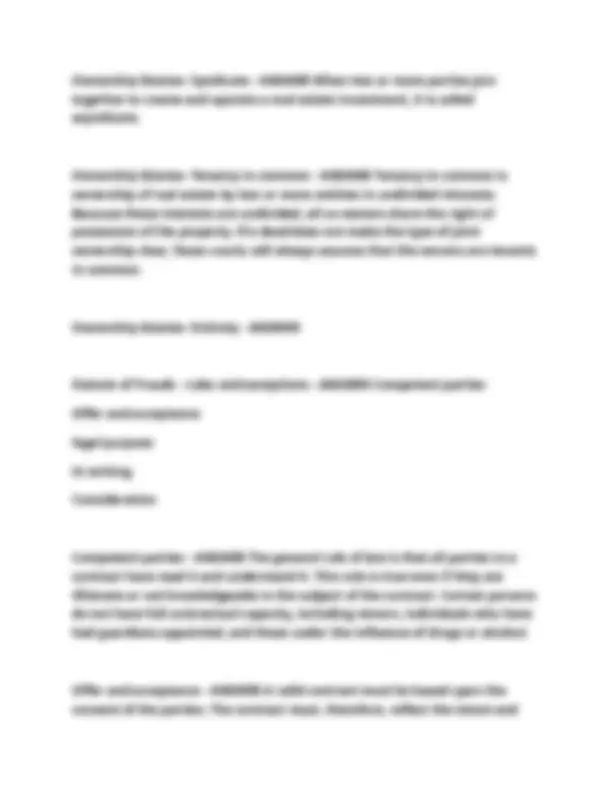


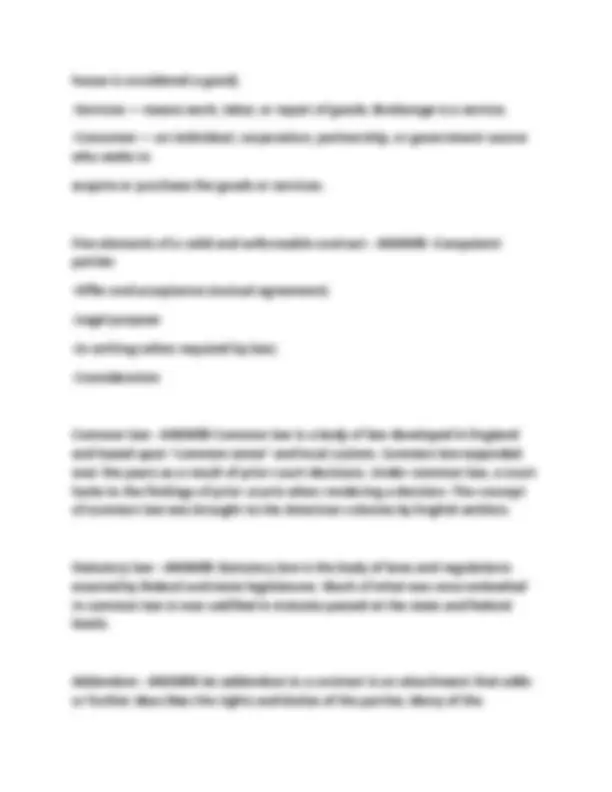
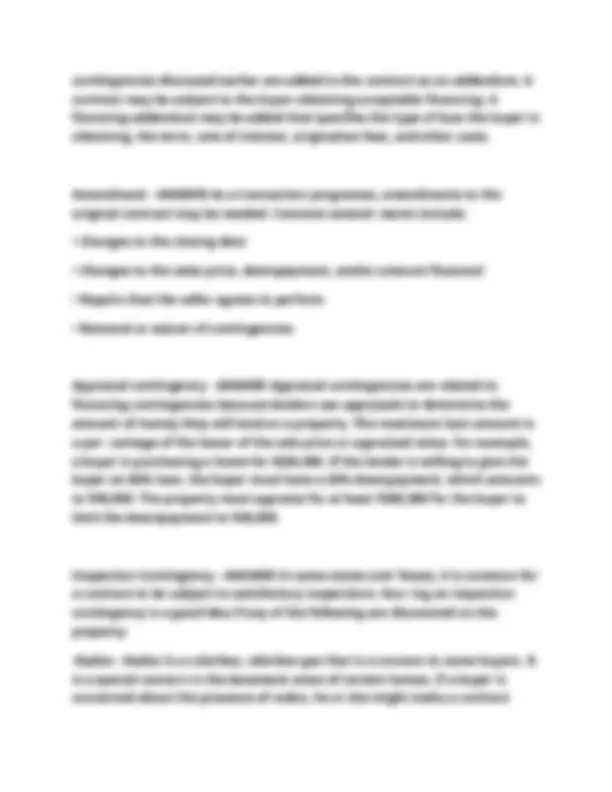
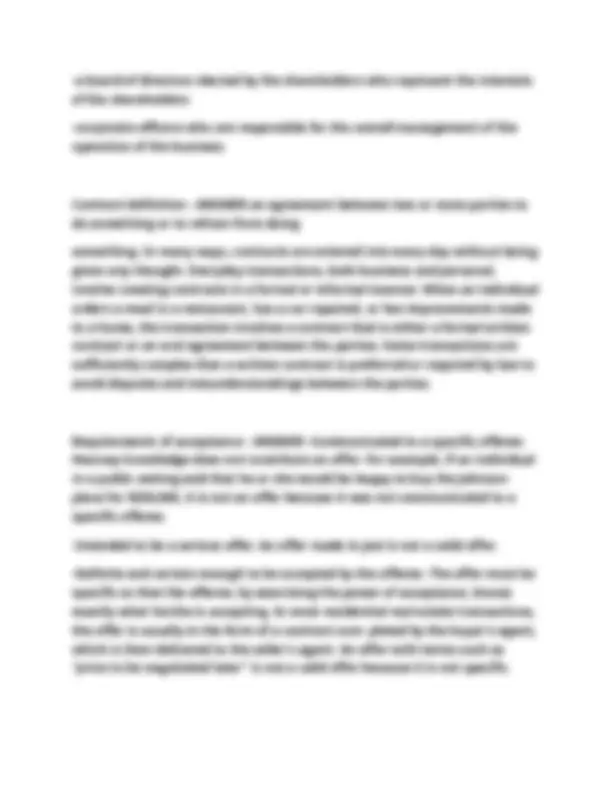
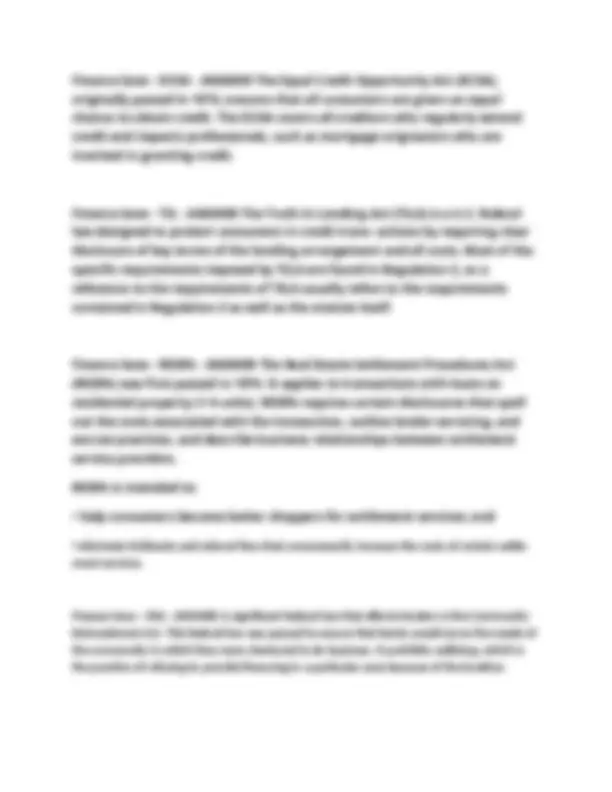
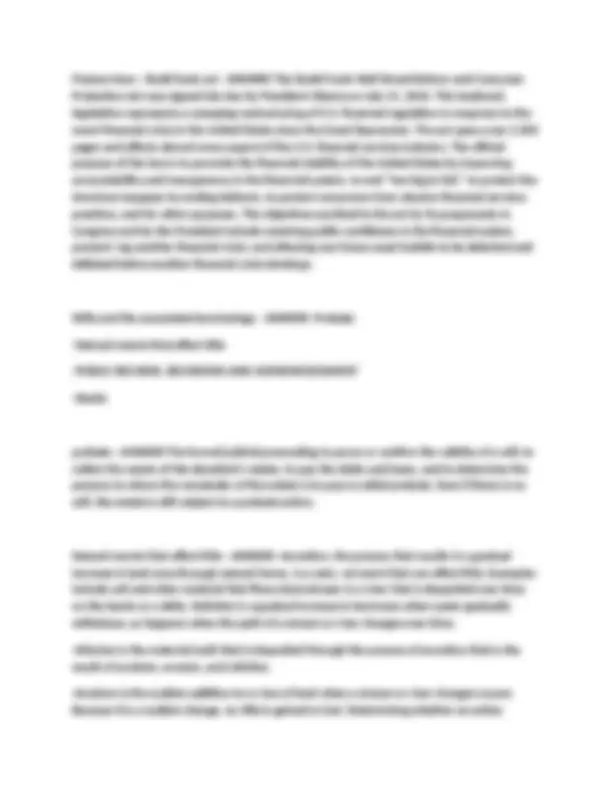




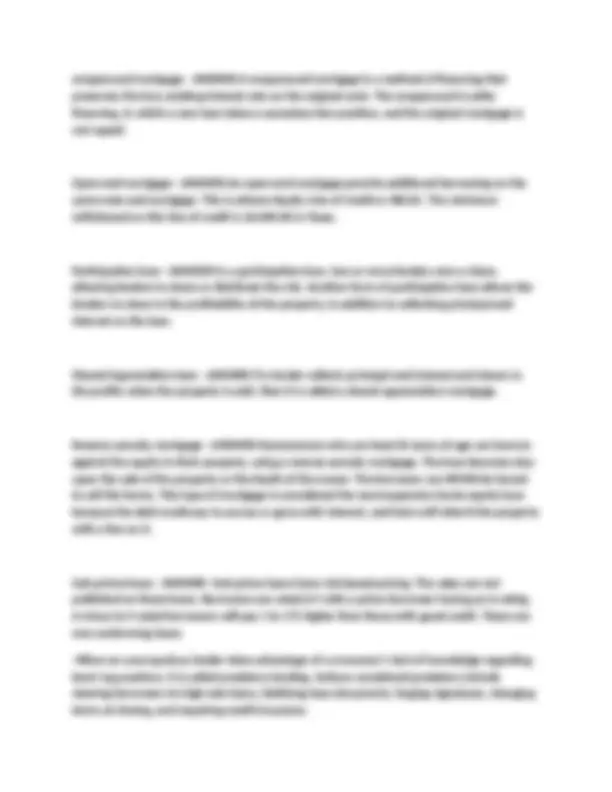



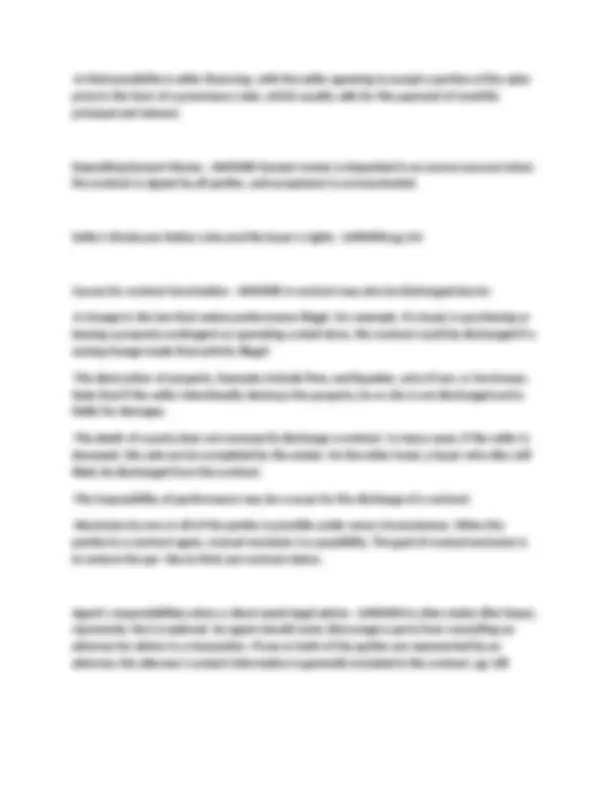



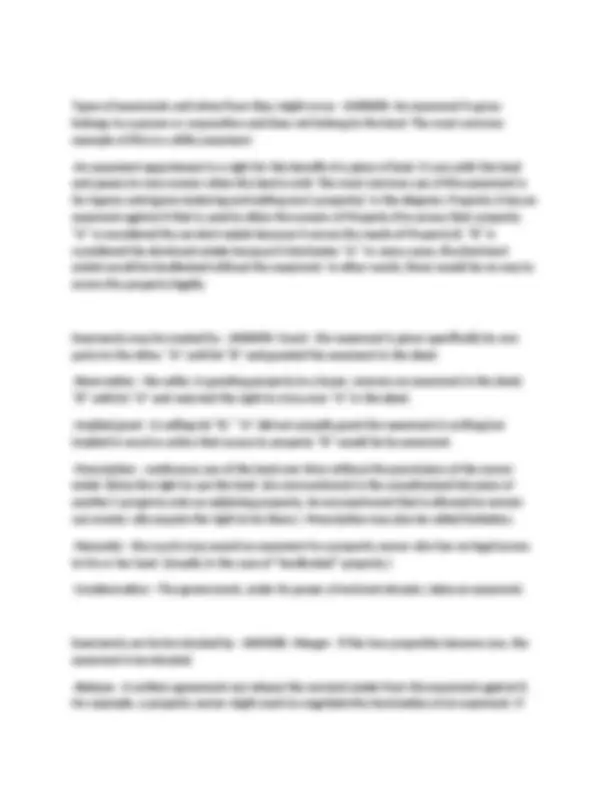
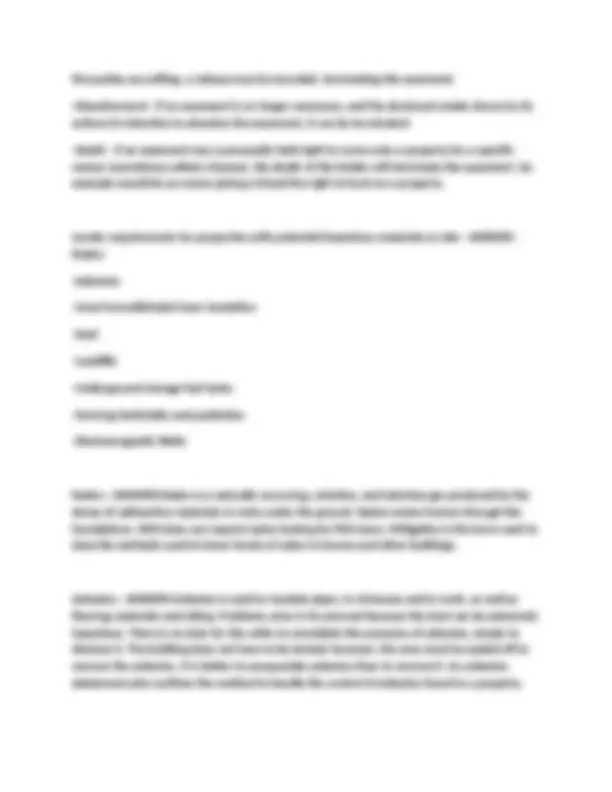

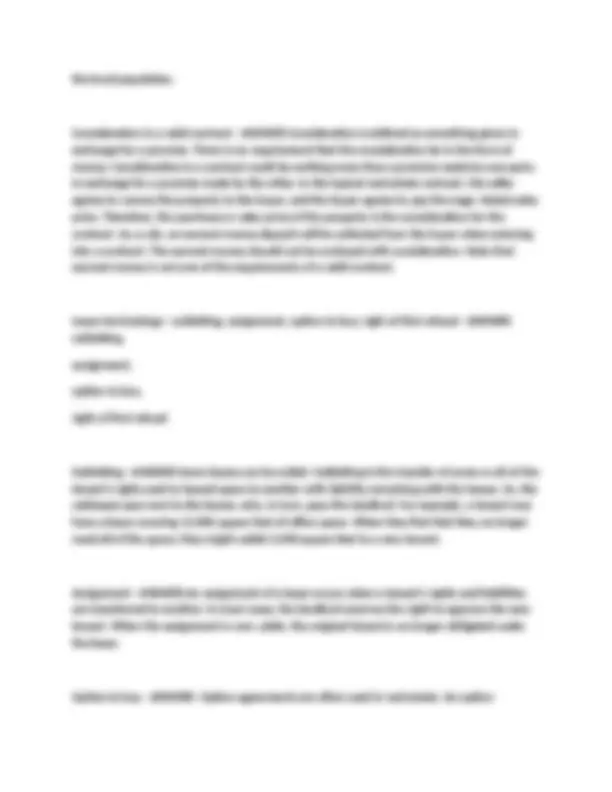

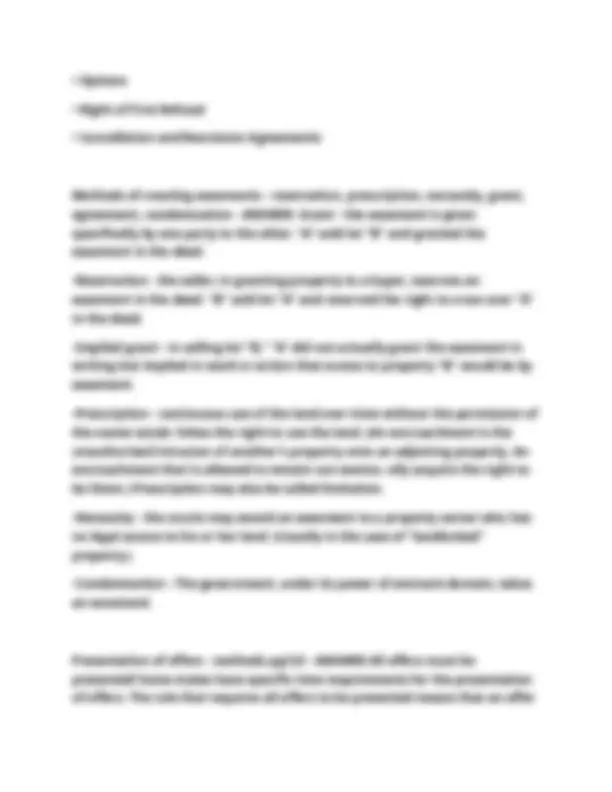



Study with the several resources on Docsity

Earn points by helping other students or get them with a premium plan


Prepare for your exams
Study with the several resources on Docsity

Earn points to download
Earn points by helping other students or get them with a premium plan
Community
Ask the community for help and clear up your study doubts
Discover the best universities in your country according to Docsity users
Free resources
Download our free guides on studying techniques, anxiety management strategies, and thesis advice from Docsity tutors
Champion School of Real Estate Test Guide With Solution.
Typology: Exams
1 / 39

This page cannot be seen from the preview
Don't miss anything!
































Default of contract and types of damages - ANSWER -In the event of default by the buyer, the seller may have several options, which include: -Liquidated damages. The seller can choose to accept the buyer's earnest money as liquidated damages, releasing all parties from any further obligation under the contract. Liquidated damages are damages that are established in the contract. -Monetary damages. In addition to specific performance, the injured party may "seek such other relief as may be provided by law." This would be an award of monetary damages by the court. Because monetary damages are awarded by the court, one never knows what they will be until the court rules. -Punitive and compensatory damages must be pursued in court. Punitive damages punish the default- ing party, and compensatory damages are set to cover the actual injury or economic loss. Leases and "right of first refusal" - ANSWER Some residential leases contain a right of first refusal, giving the tenant the right to purchase the leased property by matching or bettering any offer before the property will be sold to someone else. Default remedies and their results - ANSWER -Liquidated damages. The seller can choose to accept the buyer's earnest money as liquidated damages, releasing all parties from any further obligation under the contract. Liquidated damages are damages that are established in the contract. -Monetary damages. In addition to specific performance, the injured party may "seek such other relief as may be provided by law." This would be an award of monetary damages by the court. Because monetary damages are
awarded by the court, one never knows what they will be until the court rules. -Specific performance. The injured party files a court action seeking an order of the court directing the defaulting party to perform according to the terms of the contract. Specific performance is the only remedy that would possibly result in the full execution (closing) of the transaction. TVLB programs and provisions - ANSWER The Texas Veterans Land Board Housing Assistance Program (VHAP) is a benefit that every buyer with a military background should consider. To participate in the program, the Veteran obtains an FHA, VA, or conventional loan from a participating lender. The qualification process is the same as for any other FHA, VA, or conventional loan. The difference is that the loan is sold to the Texas Veterans Land Board (VLB), as opposed to a secondary market purchaser such as Fannie Mae or Freddie Mac. The primary benefit to the Veteran is that the rate on the Veterans Land Board loan is often up to one percent below prevailing market rates. Economic and physical characteristics of land- physical - ANSWER - Indestructibility or durability refers to the fact that land cannot be destroyed. It remains, no matter what happens to it. It may go underwater, become a crater, or be added to. In any case, the land will still be there; it is permanent. -Immobility refers to the fact that land cannot be moved. When personal property is pur- chased, the buyer can move it to a new location. When land or rights in land are purchased, the owner must go to the land. -Nonhomogeneity refers to the fact that no two parcels of land are the same. Even two identi- cal-looking lots in a subdivision at least differ in their position on the earth. Each parcel of land is unique. Economic and physical characteristics of land- Economic - ANSWER -Scarcity comes from the theory of supply and demand. When there is a shortage of some- thing that individuals want, the price goes up. For example, in a new golf course commu- nity, only a limited number of lots can be "on" the golf course. The scarcity will increase the value of these lots. Another example is
to have been delivered to the principal when it isdelivered to the agent. A license holder who fails to communicate an offer promptly may be subject to a lawsuit by the seller and may be disciplined by the real estate commission that issued the license. Title policy, abstracts, commitments, opinion of title - ANSWER Historically, when an individual was interested in acquiring title, he or she would ask an attorney or abstractor to do a title search, which is an investigation of all the documents that have been recorded about a property. This search would result in an abstract of title. An abstract of title is a complete history of the title of a piece of property that includes deeds, easements, liens, foreclosures, wills, marriages, deaths, life estates, fee simple estates, and anything else that may have ever been recorded about a property. This abstract was then given to an attorney. The attorney would read it and write up an attorney's opinion of title, which is an opinion regarding the state of the title and its ability to be transferred. TREC Temporary lease agreements and features - ANSWER -Buyer's Temporary Residential Lease - for use when the buyer occupies the property for no more than 90 days prior to closing. -Seller's Temporary Residential Lease - for use when the seller occupies the property for no more than 90 days after closing. Option contracts - ANSWER An option is an agreement between a buyer and seller or landlord and tenant. A seller, in exchange for some form of consideration (an option fee), gives the buyer the right to purchase the property at some preset price and terms for a period. If a buyer has a one- year option to purchase a tract of land at $150,000 cash, the buyer can exercise the option and purchase the property at that price any time during the year. The buyer has the option but is under no obligation to purchase.
However, under an option, the seller must sell if the buyer chooses to buy. The contract is said to be a unilateral contract because only one party is obligated to perform. A unilateral contract is said to lack mutuality. Paragraph 11 - Special Provisions - what can an agent write - ANSWER For states (like Texas) that use standard contract forms, a blank space is usually provided to allow forspecial provisions to the contract. This space is where terms can be addressed that are not covered in standard contracts or addenda forms. In all states, license holders are barred from the unlawful practice of law. Therefore, license holders should ensure that any special provisions added to a con- tract are factual statements that do not change the legal effect of the contract. Prorations and prorated items at closing - ANSWER At closing, prorations for property taxes and property owner association fees will be calculated. Taxes for the year that have not been paid will be deducted from the seller's proceeds, usually through the day of closing. Prepaid items such as property owner association fees will be collected from the buyer from closing to the end of the year. Government rights in land (PETE) - ANSWER Police Power Eminent Domain Taxation Escheat Police Power - ANSWER the right of the government to regulate and control the way land is used. The most common example of police power is zoning. Other examples include wetlands legislation, environ- mental protection
agreement (home warranty), or perform repairs and upgrades as a condition of the sale. When the seller agrees to this type of condition in a contract, the seller has made a concession. In some cases, a buyer might ask for a seller contribution to the buyer's closing costs. Seller contributions to the buyer's closing costs reduce the amount of cash needed by the buyer at closing. Counteroffer - ANSWER A counteroffer is made when a party changes an offer in some way and com- municates that change to the other party. The counteroffer is actually a two-step process: the rejection of theoriginal offer coupled with a new offer.The counteroffer is normally done by one party striking out the provision that is not acceptable and writing the accept- able term next to it. The changed term will then be initialed and sent back to the other party. Rejection - ANSWER Inmost cases, a counteroffer is arejection of the original offer.As such, the original offer is no longer available for acceptance by the offeree. For example, consider a potential buyer offering to purchase a property at $245,000. If the seller responds with a counter- offer of $255,000, the original offer of $245,000 is no longer available for acceptance by the seller, because he or she rejected it with the $255,000 counter. Acceptance - ANSWER Acceptance of an offer means that the accepting party does so with no change to the contract what- soever. Any change, no matter how trivial, turns the offer into a counteroffer. Real and Personal property transfer documents at closing - ANSWER Things of a temporary or movable nature are not part of the real property. They are considered per- sonal property. Personal property is also known as personalty or chattel. If personal property is being transferred along with real property,
a bill of sale is generally used to accomplish the transfer, which would normally accompany the deed. Escrow and trust accounts, how they are used and who administers them - ANSWER pg 177 RESPA - rules and prohibitions - ANSWER RESPA prohibits any person who, pursuant to any agreement or understanding, gives or receives a fee or a thing of value (including payments, commissions, fees, gifts, or special priv- ileges) for the referral of settlement business. Payments in excess of the reasonable value of goods provided or services rendered are considered kickbacks. Ownership estates - severalty - ANSWER When a sole individual or entity acquires real estate, an estate in severalty is created. The sole or single owner is "severed" or "set apart" from all others. The advantage of ownership in severalty is total control of the property. The disadvantage is full responsibility. In addition to individuals, com- panies may hold ownership in severalty. A corporation may be composed of many shareholders, but the corporation is viewed, under the law, as a single legal entity. If only one signature is required on a deed conveying full ownership of the property to another, the seller owns an estate in severalty. Ownership Estates- joint tenancy - ANSWER A less popular type of ownership by more than one is joint tenancy. The unique aspect of joint tenancy is the right of survivorship of the tenants. When a joint tenant dies, his or her share is equally divided among the surviving joint tenants immediately. In order to create a joint tenancy, four unities are required.
wishes of the parties. Mutual consent is often referred to as mutual consent or a "meet- ing of the minds." For a contract to exist, there must have been a meeting of the minds (offer and acceptance) between the parties. The determination of mutual consent is usually a question of fact and is completed by the process of offer and acceptance. legal purpose - ANSWER A contract for an illegal purpose is void, and the law treats the contract as if it were never created. An example of a void contract would be one to have somebody killed or to deliver illegal drugs. In writing - ANSWER In order to comply with the Statute of Frauds, contracts for the conveyance of an interest in real estate or leases for a term of more than one year must be in writing. If the contract is not in writing, it would be valid but not enforceable. Consideration - ANSWER Consideration is defined as something given in exchange for a promise. There is no requirement that the consideration be in the form of money. Consideration in a contract could be nothing more than a promise made by one party in exchange for a promise made by the other. In the typical real estate contract, the seller agrees to convey the property to the buyer, and the buyer agrees to pay the nego- tiated sales price. Therefore, the purchase or sales price of the property is the consideration for the contract. As a rule, an earnest money deposit will be collected from the buyer when entering into a contract. The earnest money should not be confused with consideration. Note that earnest money is not one of the requirements of a valid contract. Limits on title - claims, liens, charges - ANSWER A lien is a right given by law to certain creditors to have debts paid out of the property of a default- ing debtor, usually through a court sale. A lienholder does not own the property
that is encumbered. Instead, the holder has an interest that, in some cases, may result in the foreclosure of the property. Common examples of liens include:
enter into a lease-purchase agreement should be referred to an attorney. License holders in Texas are specifically prohibited from writing this type of agreement for their clients. Executed vs executory contracts - ANSWER Once all the terms of an offer have been agreed to and signed by the parties and the acceptance communicated to the offeror, the contract becomes binding on the parties. The contract is known as an executory contract from the effective date through the closing. An executory contract is definedas a contract that is binding on the parties, with one or more of the parties having contractual duties that have not yet been performed. The effective date is the date that acceptance was communicated to the offering party. For example, if a seller accepted an offer from the buyer on Monday, January 3rd, and the buyer was notified of the seller's acceptance on Tuesday, January 4th, the effective date of the contract is January 4th. FHA loans - insurance premiums associated with them - ANSWER Because the FHA is a mortgage insurance program, premiums are paid into a pool of funds, out of which claims are paid when a borrower defaults on a loan. The cost of the mortgage insurance is passed along to the borrower in the form of a mortgage insurance premium (MIP). The borrower pays two premiums, an upfront premium at closing, and an annual premium. Up-Front Mortgage Insurance Premium (UFMIP): When a loan is funded, the FHA charges an Up-Front Mortgage Insurance Premium. The UFMIP can be paid at closing or added to the loan at funding. The UFMIP can be added to the loan even if it causes the loan to exceed the appraised value of the property. DTPA coverage categories - ANSWER -Goods — are defined as tangible chattels (real property is tangible when purchased or leased. Under DTPA, the sale of a
house is considered a good). -Services — means work, labor, or repair of goods. Brokerage is a service. -Consumer — an individual, corporation, partnership, or government source who seeks to acquire or purchase the goods or services. Five elements of a valid and enforceable contract - ANSWER -Competent parties -Offer and acceptance (mutual agreement) -Legal purpose -In writing (when required by law) -Consideration Common law - ANSWER Common law is a body of law developed in England and based upon "common sense" and local custom. Common law expanded over the years as a result of prior court decisions. Under common law, a court looks to the findings of prior courts when rendering a decision. The concept of common law was brought to the American colonies by English settlers. Statutory law - ANSWER Statutory law is the body of laws and regulations enacted by federal and state legislatures. Much of what was once embodied in common law is now codified in statutes passed at the state and federal levels. Addendum - ANSWER An addendum to a contract is an attachment that adds or further describes the rights and duties of the parties. Many of the
subject to satisfactory radon testing. -Lead-based paint - Under federal law, all sellers of homes built prior to 1978 must provide to the buyer a disclosure of their knowledge of possible lead- based paint hazards. Families, par- ticularly those with young children, have a special concern regarding lead-based paint because of the effect of lead on the immune systems of young children. Lead-based paint testing is recommended if this is a concern. In older homes, lead may have leached into the soil in the crawl space under a home or around the foundation as a result of paint peeling and accumu- lating in the soil. Contingency - ANSWER A contingency is a provision in a contract that requires that a specific act or event happens for the contract to be binding on the party. A contingency must be specific as to what action needs to take place, who must complete the action, and when it will be completed. Perhaps the most common contingency found in residential real estate contracts is the financing contingency. The term subject to is synonymous with contingent. A contract may be said to be "subject to the buyer obtaining financing." Likewise, a contract with a financing contingency may be said to be "contingent upon the buyer obtaining financing." The SAFE Act - terminology - ANSWER -The Secure and Fair Enforcement for Mortgage Licensing Act is designed to enhance consumer protec- tion and reduce fraud. -The SAFE Mortgage Licensing Act was designed to enhance consumer protection and reduce fraud by encouraging states to establish minimum standards for the licensing and registration of state- licensed mortgage loan originators, and the establishment of a nationwide mortgage licensing system and registry for the residential mortgage industry. All residential mortgage loan originators must register with the Nationwide Mortgage Licensing System and Registry (NMLSR).
Types of businesses - ANSWER -sole proprietorship -PARTNERSHIPS -CORPORATE OWNERSHIP sole proprietorship - ANSWER A sole proprietorship is a venture that is owned by one individual. The primary benefit of a sole proprietorship is that the owner has total control of the business. The potential downside of this form of ownership is that the owner also has full liability for the financial and personal obligations of the business. partnership - ANSWER Another type of business entity is the partnership. A partnership is more easily created than a cor- poration and can be created with a simple written or oral agreement. -General Partner - The general partner is responsible for the day-to-day operations of the busi- ness and has full liability. At least one general partner is required in a limited partnership. The general partner is most often the "promoter" who brought the limited partners into the venture. -Limited Partners - The limited partner's liability is limited to the amount he or she invested in the partnership. The limited partner has no involvement in the day-to-day operation of the business. The limited partners are the investors in the venture. CORPORATE OWNERSHIP - ANSWER In most states, corporations are created with a filing with the Office of the Secretary of State or a similar agency. The corporate entity is comprised of three components: -shareholders (stockholders) who are the owners of the corporation
Finance laws - ECOA - ANSWER The Equal Credit Opportunity Act (ECOA), originally passed in 1974, ensures that all consumers are given an equal chance to obtain credit. The ECOA covers all creditors who regularly extend credit and impacts professionals, such as mortgage originators who are involved in granting credit. Finance laws - TIL - ANSWER The Truth In Lending Act (TILA) is a U.S. federal law designed to protect consumers in credit trans- actions by requiring clear disclosure of key terms of the lending arrangement and all costs. Most of the specific requirements imposed by TILA are found in Regulation Z, so a reference to the requirements of TILA usually refers to the requirements contained in Regulation Z as well as the statute itself. Finance laws - RESPA - ANSWER The Real Estate Settlement Procedures Act (RESPA) was first passed in 1974. It applies to transactions with loans on residential property (1-4 units). RESPA requires certain disclosures that spell out the costs associated with the transaction, outline lender servicing, and escrow practices, and describe business relationships between settlement service providers. RESPA is intended to:
Finance laws - Dodd frank act - ANSWER The Dodd-Frank Wall Street Reform and Consumer Protection Act was signed into law by President Obama on July 21, 2010. This landmark legislation represents a sweeping restructuring of U.S. financial regulation in response to the worst financial crisis in the United States since the Great Depression. The act spans over 2, pages and affects almost every aspect of the U.S. financial services industry. The official purpose of the law is to promote the financial stability of the United States by improving accountability and transparency in the financial system, to end "too big to fail," to protect the American taxpayer by ending bailouts, to protect consumers from abusive financial services practices, and for other purposes. The objectives ascribed to the act by its proponents in Congress and by the President include restoring public confidence in the financial system, prevent- ing another financial crisis, and allowing any future asset bubble to be detected and deflated before another financial crisis develops. Wills and the associated terminology - ANSWER -Probate -Natural events that affect title -PUBLIC RECORDS, RECORDING AND ACKNOWLEDGMENT -Deeds probate - ANSWER The formal judicial proceeding to prove or confirm the validity of a will, to collect the assets of the decedent's estate, to pay the debts and taxes, and to determine the persons to whom the remainder of the estate is to pass is called probate. Even if there is no will, the estate is still subject to a probate action. Natural events that affect title - ANSWER -Accretion, the process that results in a gradual increase in land area through natural forces, is a natu- ral event that can affect title. Examples include soil and other material that flows downstream in a river that is deposited over time on the banks or a delta. Reliction is a gradual increase in land area when water gradually withdraws, as happens when the path of a stream or river changes over time. -Alluvion is the material (soil) that is deposited through the process of accretion that is the result of avulsion, erosion, and reliction. -Avulsion is the sudden addition to or loss of land when a stream or river changes course. Because it is a sudden change, no title is gained or lost. Determining whether an action